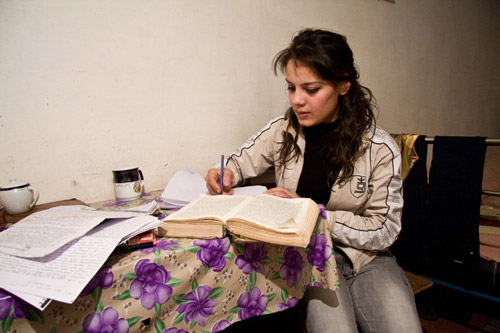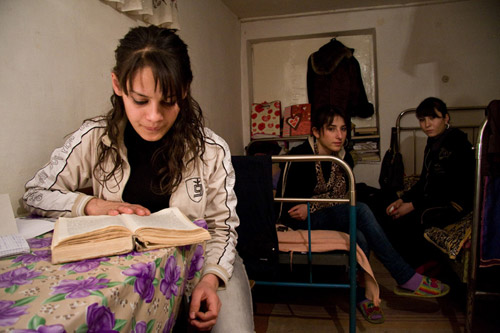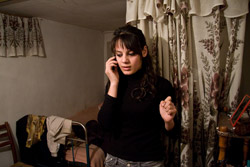http://armregions.am/am/2011/12/13/news-1323766259
By Knar BABAYAN
www.armregions.am
‘For three years I had to go to the neighboring village for school. I had to cross 7 km there and back daily. And it was then that I made my mind to go in for sport. My physical training master advised me to run. I tried and I did it. And I had been running to school and back home since that day. Now, as a result of it, I have 13 diplomas of honor and a gold medal,’ tells Mariam, student, 19.
The young girl recalls that it was then that she participated in the Olympiad in the Armenian language for the first time and got 0 point.
‘I was ashamed even to look in the faces of the teachers and I used to cry going to school every day. Then once I said to myself I was not going to win by crying and I had to struggle for a victory – persistently and up to the end,’ she says.
Most students from regions that come to Stepanakert prefer the basements of private houses on Hamo Sahyan street to convenient rented apartments – mainly for the comparatively low prices. For the second-year student Mariam Aghajanyan from Hakaku village of Hadrut region low price is the most important factor.
Two beds, a table and two chairs, a small book-shelf and a wood stove – the only window of this modest student lodging is too small and too low to let the beams of the light in.
Mariam shares this room with her friend. She does not complain of the conditions. In general, she does not complain.
‘My family is hardly making ends meet. Nobody works in the family. We survive with pension of 80 thousand drams ($ 207) a month. Of course, we have cattle, an orchard and we cultivate a vineyard, but all this hardly suffices. Sometimes we sell a little part of the harvest,’ she says.
Mariam never bothers her family by asking money or food. If they can, they will send without asking, she says.
‘During the year and a half of my studentship only twice I’ve called and asked money. Once I had only 10 drams ($ 0,02) and nothing to eat. I got angry and called home and ask them to send me something,’ she says.
Mariam explains that when she was living alone, it was hard but she was making it somehow, even if there was nothing to eat, but now, when she lives with a friend, she feels uncomfortable to say she has no money.
‘I have lived with 3000 drams ($ 8) for one month, trying to avoid extra expenses and just buying bread and my family sending something to eat from the village,’ says the student and confesses at the moment she has only 170 drams ($ 0,4) and that her mother has just come and brought 2000 drams ($ 5).

‘Earlier my grandfather had come and left me 20 thousand drams ($ 52) 15 thousand ($ 39) of which was the room fee and the rest for the electricity and wood for heating. Then the weather sharply turned cold and I had to buy a coat. My granddad got very angry,’ says Mariam gently smiling and adds that yet she managed to cover all those expenses with that money and her scholarship.
The scholarship is usually spent on photocopying the lectures. Mariam assures most professors do not deliver normal lectures and prefer having students photocopy the material.
I asked her whether she had ever thought of leaving all and going back to her village, to which Mariam said ‘Never’, and there was no hesitation in her answer.
If the family is no longer able to help she is ready to work.
‘I am ready to start working even now, but I have to study a lot. Getting excellent marks is like a job for me. Thus I save 250 thousand drams ($ 648) per year. Believe me, it is an enormous sum of money for my family,’ she says.
Mariam confesses that malevolence of some friends and sarcasm of the people around help her overcome the difficulties. Many have told her there is no point in her being educated, since none in her family has been.
‘I was still very little, when my granddad swore to help me get higher education. While I was a schoolgirl my granddad flogged me once or twice and after that I realized that I must learn well. Then all on my own and without additional classes with a private tutor I entered the Faculty of History and Political Sciences of Artsakh State University. Now I am a high achiever and I want to prove that people shouldn’t be classified, and moreover, made fun of,’ hardly pronounces Mariam no longer able to swallow her tears.
Due to the hard financial conditions Mariam is able to visit her village only once in two months.

‘I have to pay 2400 drams ($ 6) for one visit to my family and back. Since there is no public transportation to the village, I have to travel to Hadrut on a bus and then walk 7 km for home,’ she says.
Mariam is the only present-day student from Hakaku village.
Speaking of the future and her dreams, she says education is her priority, as she hopes to get a good job with it. She must earn well enough to take care of her family.
‘At present, the whole burden of the family is on my granddad’s shoulders. And God forbid something should happen to him! I will have to undertake that load,’ Mariam looks perplexed and adds she is her own only hope and support. She has goals that must be achieved.
I asked how she was going to celebrate the New Year. She slightly smiled and said in no particular way.
‘I cannot recall us celebrating any specific holiday, even our birthdays. The only birthday I celebrated was this year. I was born on May 9th, the Victory Day. After the festive concert, all wet in the rain, we gathered with friends and celebrated it,’ recalls Mariam with unhidden joy, going back to that day in her memories.
I asked her to recall a bright memory or a nice story. She thought for a few moments and started telling about her last year meeting with the inmates of Stepanakert’s boarding school.
‘The eyes of the children and their stories do not go out of my head,’ she said.
‘Why? Are those feelings familiar to you?’
After a long pause:
‘The thing is that I lived three years with my father and his parents. My mother and sister were living separately. I understand the children at orphanages and I know very well what it feels to miss your mother and not to be able to see her. I even used to steal some food from home and take it secretly to my sister. I was then being strictly punished for each such theft. Now, thanks Heaven, those days are gone and we all live together.’
Mariam is now waiting for her scholarship to buy some sweets for the New Year and go and see the children at the boarding school.
Translated by Narine Aghabekyan

